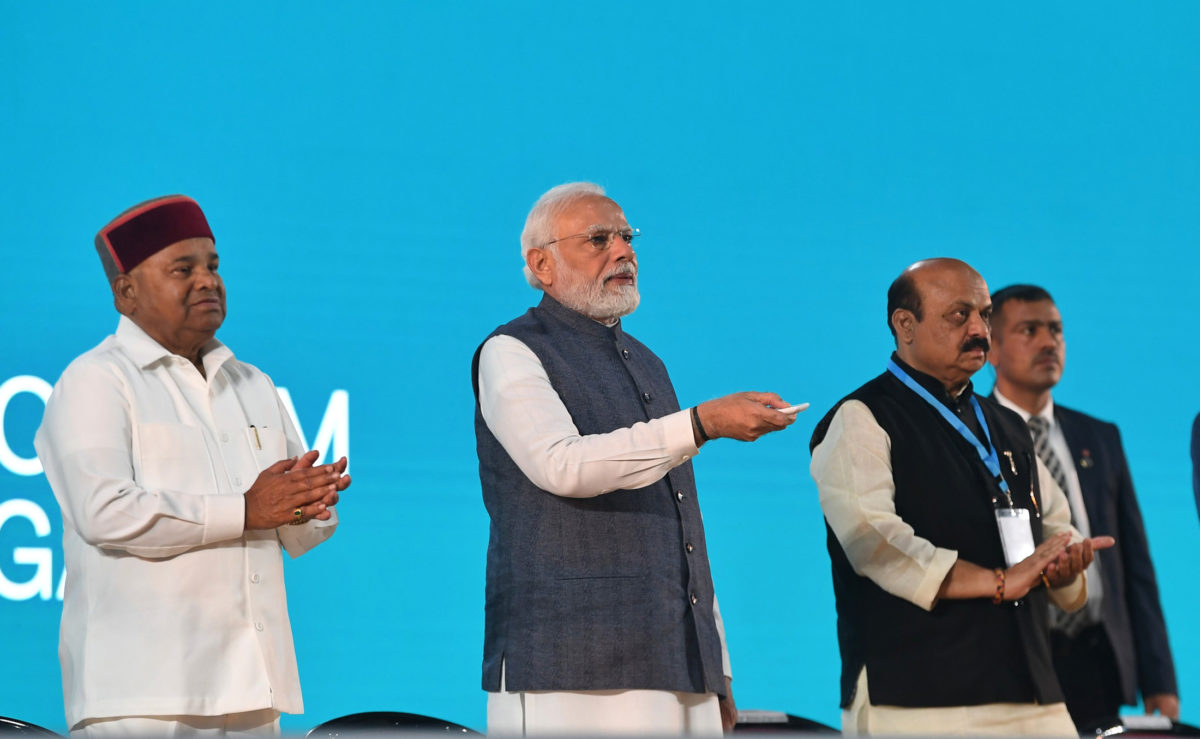Prime Minister Narendra Modi today inaugurated India Energy Week 2023 in Bengaluru. At the event, he flagged off the commercial roll-out of IndianOil’s indoor solar cooking system with twin-cooktop. The Prime Minister said that the solar cooktop launched today is going to give a new dimension to green and clean cooking in India. “More than three crore households will have access to solar cooktops within the next 2-3 years,” he continued. “With more than 25 crore families in India, this will bring a revolution in the kitchen.”
India Energy Week 2023, being organized from February 6 to 8, aims to showcase India’s rising prowess as an energy transition powerhouse. The event will see the presence of more than 30 ministers from across the world. Over 30,000 delegates, 1,000 exhibitors, and 500 speakers will gather to discuss the challenges and opportunities of India’s energy future.
Addressing the gathering, the Prime Minister said, “India is one of the strongest voices in the world for energy transition and for developing new resources of energy. Unprecedented possibilities are emerging in India that is moving with a resolution of a Viksit Bharat [developed India].” He called upon the stakeholders to explore every possibility related to India’s energy sector and get involved with it. “Today India is the most suitable place in the world for your investment,” he said.
Referring to the recently released IMF projections of India being the fastest-growing major economy, Modi added that India has continued to be the global bright spot in the world stricken with the pandemic and the era of war in 2022.
Quoting International Energy Association, the Prime Minister remarked that India’s energy demands will be highest in the present decade, which presents an opportunity for the investors and stakeholders of the energy sector. He said India’s share in the global oil demand is 5%, which is expected to rise to 11%, whereas the gas demand of India is expected to rise to 500%. He underlined that new opportunities for investment and collaboration are being created by the expanding energy sector of India.
The Prime Minister highlighted four major verticals for India’s energy sector strategy: Increasing domestic exploration and production; diversifying the supply; expanding fuels like biofuel, ethanol, compressed biogas, and solar; and de-carbonization via electric vehicles and hydrogen.
“The National Green hydrogen mission will give a new direction to the India of the 21st century,” the Prime Minister remarked. He underlined that the country is aiming to produce 5 MMTPA green hydrogen by the end of this decade which brings in the possibility of investments of more than Rs 8 lakh crore. He also added that India will increase the share of green hydrogen to 25% by replacing grey hydrogen.
The Prime Minister noted that batteries constitute 40-50% of the cost of electric vehicles. He said the government’s PLI scheme with a budgetary layout of INR18,000 crore will be a significant step towards creating 50 GWh of manufacturing capacity for advanced chemistry cells.
The Prime Minister said India’s union budget 2023-24 has allocated INR 35,000 crore for priority capital investment to push energy transition and net-zero objectives. Provision for INR 10 lakh crore capital expenditure will give a push to green hydrogen, solar to road infrastructure.
He further said India’s installed renewable energy capacity increased from 70 GW to about 170 GW. In that, solar power increased by 20 times. India, he said, is at number four in wind power capacity. “We are aiming to have 50% non-fossil fuel capacity by the end of this decade. “We are also working very fast on biofuel, and ethanol blending. In the last nine years, we have increased ethanol blending in petrol from 1.5% to 10%. Now we are moving towards the target of 20% ethanol blending,” the prime minister added.
This content is protected by copyright and may not be reused. If you want to cooperate with us and would like to reuse some of our content, please contact: editors@pv-magazine.com.









By submitting this form you agree to pv magazine using your data for the purposes of publishing your comment.
Your personal data will only be disclosed or otherwise transmitted to third parties for the purposes of spam filtering or if this is necessary for technical maintenance of the website. Any other transfer to third parties will not take place unless this is justified on the basis of applicable data protection regulations or if pv magazine is legally obliged to do so.
You may revoke this consent at any time with effect for the future, in which case your personal data will be deleted immediately. Otherwise, your data will be deleted if pv magazine has processed your request or the purpose of data storage is fulfilled.
Further information on data privacy can be found in our Data Protection Policy.